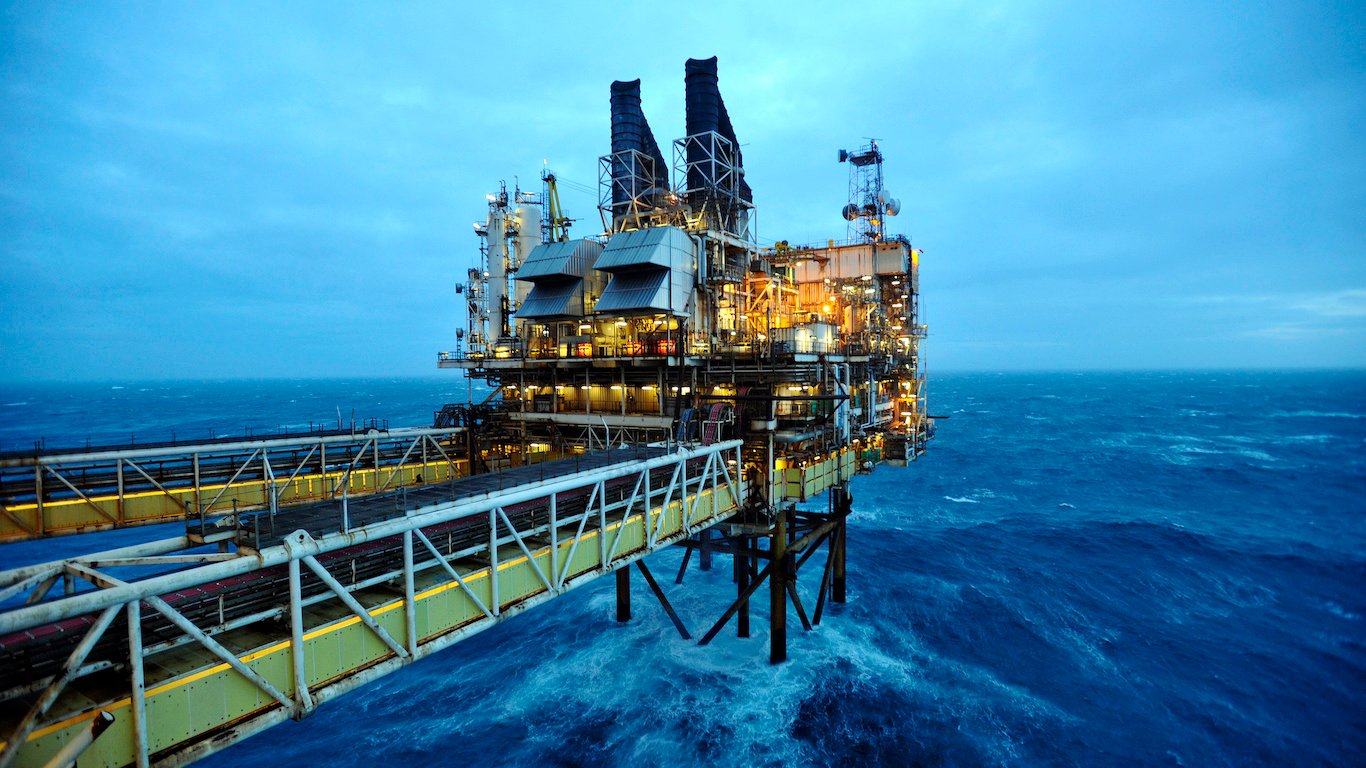

Oil is a natural resource formed by the decay of organic matter over millions of years. And like many other natural resources, oil cannot be produced, only extracted where it already exists. Unlike every other natural resource, oil is the lifeblood of the global economy.
The world derives over a third of its total energy production from oil, more than any other source by far. As a result, the countries that control the world’s oil reserves often have disproportionate geopolitical and economic power.
24/7 Wall St. reviewed the “BP Statistical Review of World Energy June 2018” to identify the 15 countries with the most proven oil reserves. The countries on this list span five continents and control anywhere from 12.8 billion barrels of oil to 303.2 billion barrels of oil.
In most cases, oil has been an economic boon for the countries on this list. Often, due in large part to oil production, many of these places rank among the most productive countries in the world.
If mismanaged, however, oil wealth can also be a curse. Having a diversified economy is always prudent, and many countries on this list are overly dependent on their oil wealth. As a result, many have suffered economically since global oil prices fell precipitously from $115 a barrel in mid-2014 to less than $35 a barrel in early 2016. In one extreme case, the economic collapse triggered by an over-dependence on oil created a crisis so severe, it is now one of the 14 countries the U.S. Government does not want you to visit.
Click here to see the 15 countries that control the world’s oil
To identify the countries that control the world’s oil, 24/7 Wall St. ranked countries by 2017 proven oil reserves — those quantities that geological and engineering information indicates with reasonable certainty can be recovered in the future from known reservoirs under existing economic and operating conditions. proven oil reserves data came from “BP Statistical Review of World Energy June 2018.” Reserves as a share of world total reserves and oil production in barrels also came from BP’s report. Each country’s gross domestic product (GDP) per capita is based on purchasing-power-parity (PPP) for 2017 (chained to current International Dollars) and came from the International Monetary Fund. We also used information from the U.S. Energy Information Administration (EIA) and MIT Media Lab’s The Observatory of Economic Complexity.
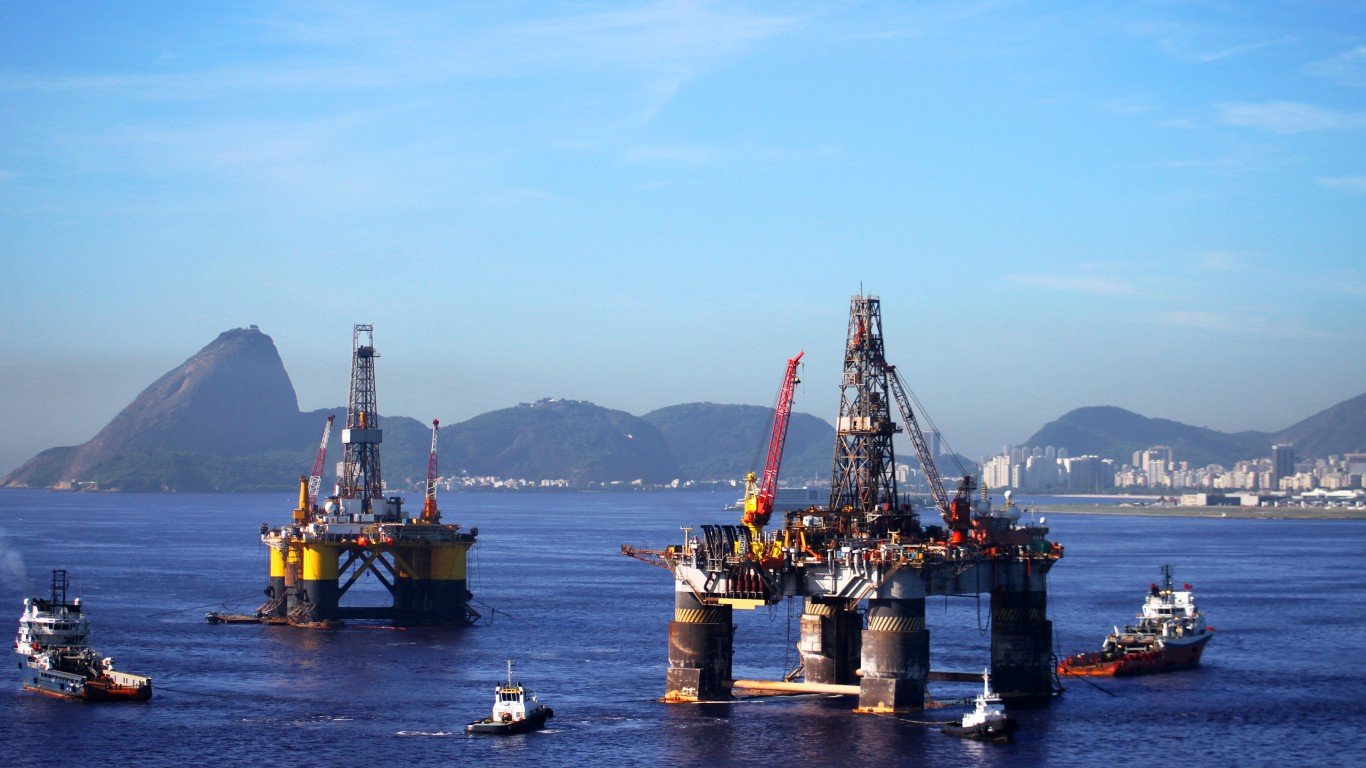
15. Brazil
> Proven oil reserves: 12.8 billion barrels (0.8% of world total)
> 2017 daily oil production: 2.7 million barrels
> 5 yr. oil production change: +27.5%
> GDP per-capita: $15,553
One of two South American countries on this list, Brazil’s proven oil reserves total 12.8 billion barrels, approximately 0.8% of the global supply. Crude and refined petroleum comprised nearly 9% of Brazil’s $219 billion in exports in 2017, and most of it was sold to China and the United States, according to MIT Media Lab’s The Observatory of Economic Complexity. Oil production in Brazil climbed by 27.5% in the last half decade, even as production declined across central and South America by 2.6%.
Petrobras, a publicly held energy company, is the largest oil producer in the country, operating 13 of the 17 refineries in Brazil.
[in-text-ad]
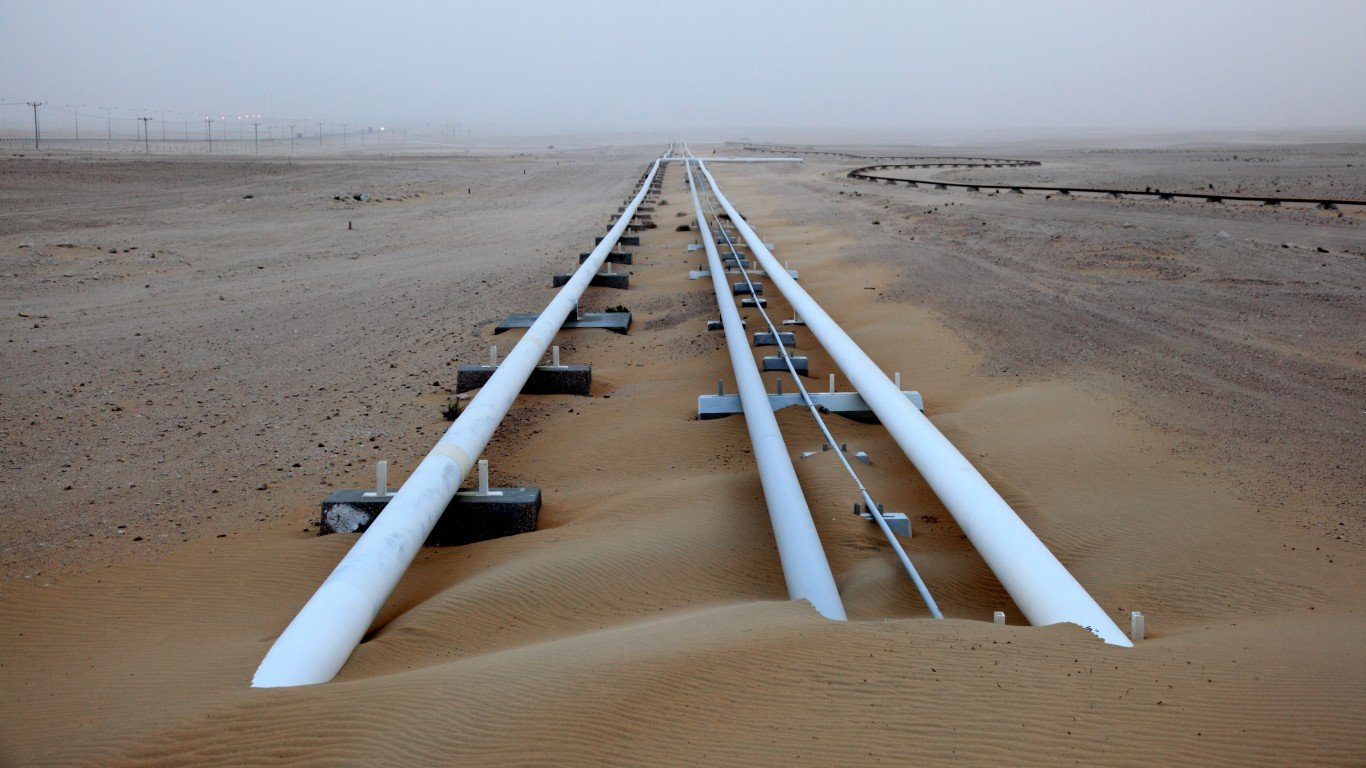
14. Qatar
> Proven oil reserves: 25.2 billion barrels (1.5% of world total)
> 2017 daily oil production: 1.9 million barrels
> 5 yr. oil production change: -1.2%
> GDP per-capita: $128,647
Qatar is a small Middle Eastern nation of less than 3 million people. With a small population, and a wealth of oil — over 25.2 billion barrels in proven reserves — Qatar has the highest GDP per capita of any country in the world, at $128,647. Oil revenue helps finance public works and services in the country. Petroleum accounted for over 80% of Qatar’s $52.3 billion in exports in 2017.
Qatar was a member of the Organization of the Petroleum Exporting Countries, or OPEC, until it withdrew in 2019. The country’s decision to leave the intergovernmental organization was a strategic one in the face of OPEC’s waning global influence, according to Qatari officials.
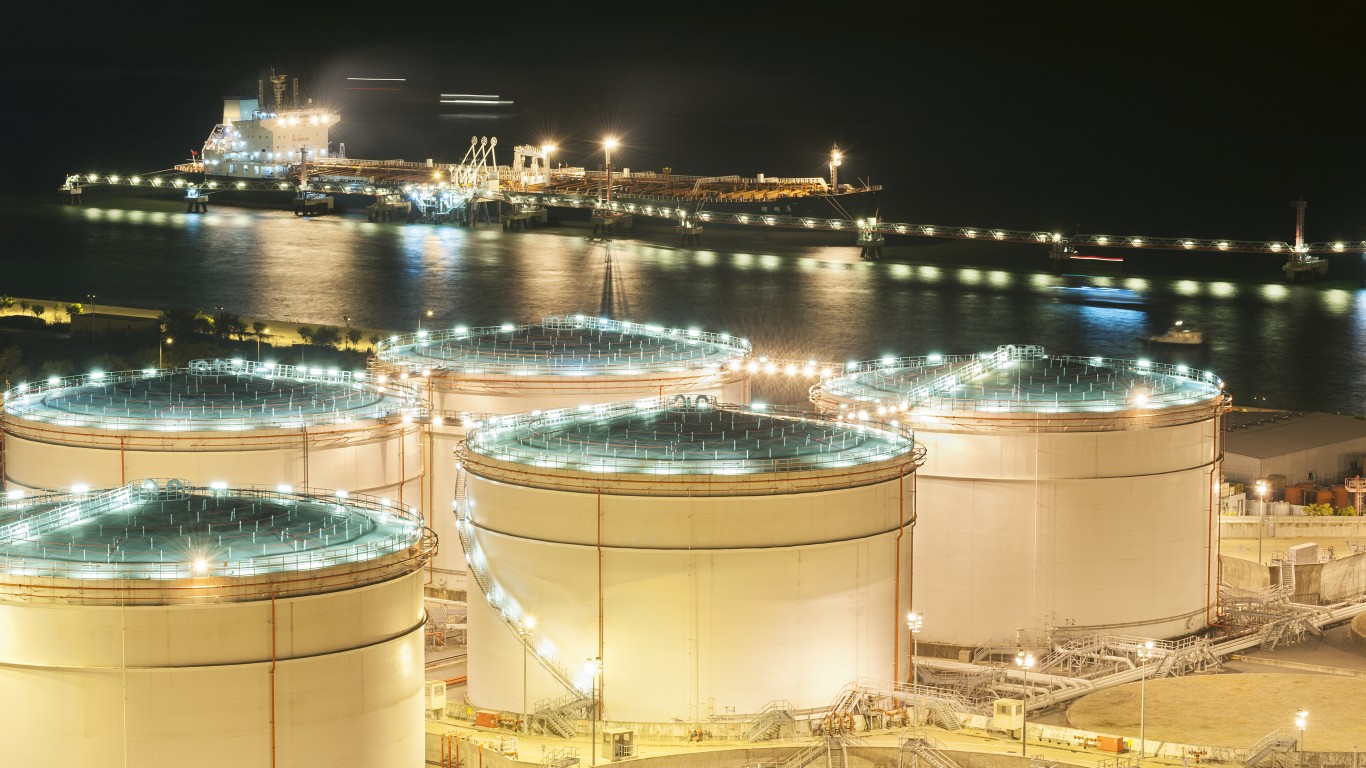
13. China
> Proven oil reserves: 25.7 billion barrels (1.5% of world total)
> 2017 daily oil production: 3.8 million barrels
> 5 yr. oil production change: -7.4%
> GDP per-capita: $16,842
Spanning about 3.7 million square miles, China has the fourth largest landmass of any country in the world. The most populous country in the world, China relies more on oil than every country other than the United States for its energy needs. China burned about 608 million tons of oil in 2017 alone. State-owned Sinopec and China National Petroleum Corporation (CNPC) are major drivers of the nation’s fossil fuel industry. They are two of China’s and the world’s largest energy companies.
Due in part to its domestic energy demand, China also imports oil. Petroleum imports — primarily from Saudi Arabia, Iran, Iraq, and other Middle Eastern countries — accounted for over 10% of China’s $1.5 trillion in imports in 2017.
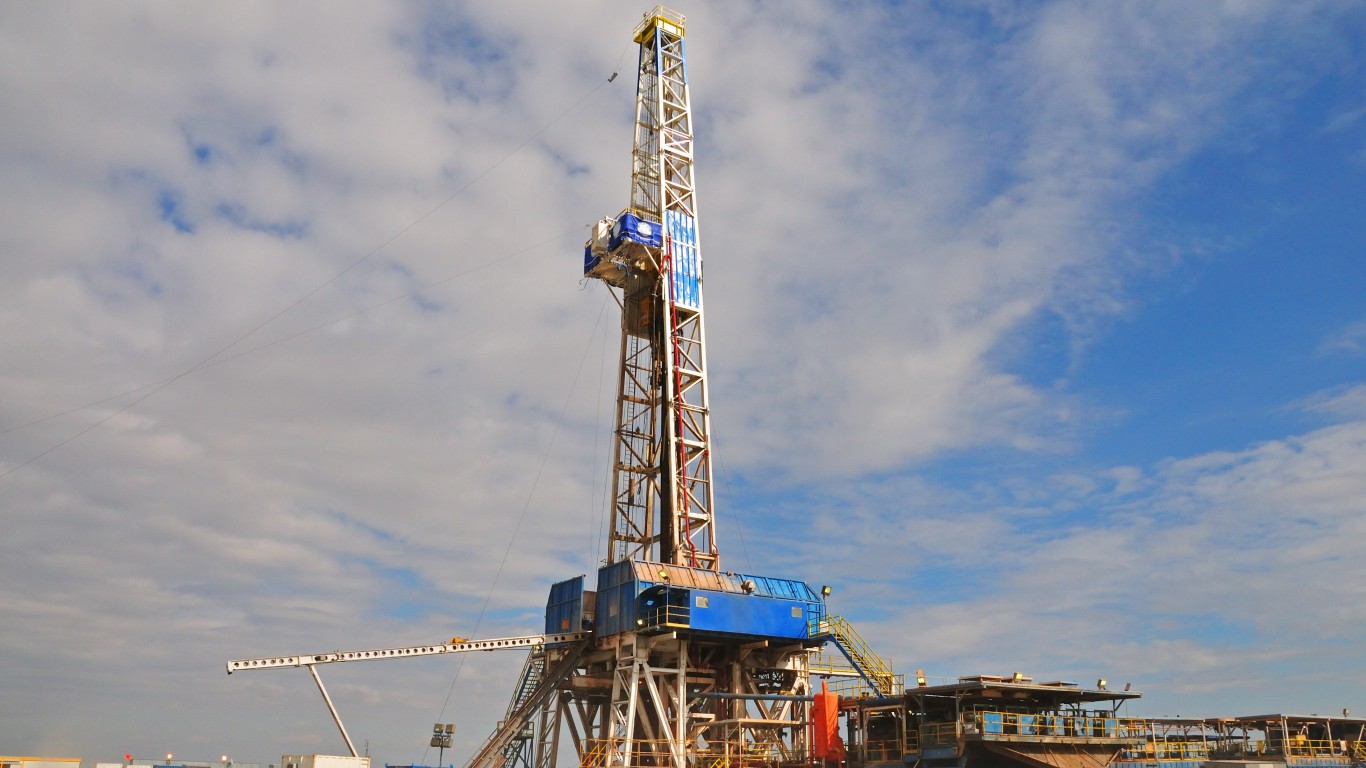
12. Kazakhstan
> Proven oil reserves: 30.0 billion barrels (1.8% of world total)
> 2017 daily oil production: 1.8 million barrels
> 5 yr. oil production change: +10.2%
> GDP per-capita: $26,491
Kazakhstan is a massive country of about 1.0 million square miles, roughly the size of Western Europe. Much of Kazakhstan’s 30 billion in proven oil reserves is in the resource-rich western section of the country. Over half of Kazakhstan’s $44.1 billion in exports in 2017 was petroleum.
Kazakhstan has ramped up oil production in recent years. The country produced an average of 1.8 million barrels of oil a day in 2017, up over 10% from just five years prior.
[in-text-ad-2]
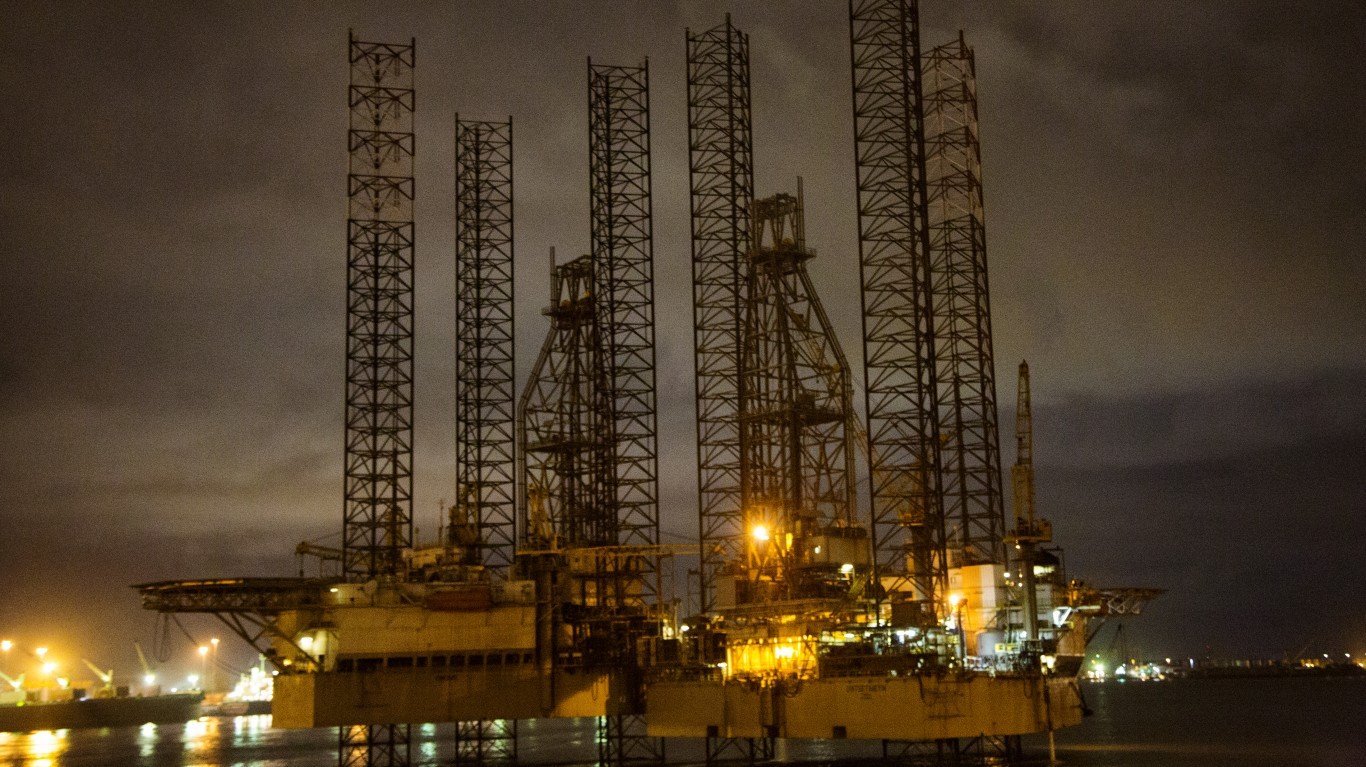
11. Nigeria
> Proven oil reserves: 37.5 billion barrels (2.2% of world total)
> 2017 daily oil production: 2.0 million barrels
> 5 yr. oil production change: -17.6%
> GDP per-capita: $5,887
Nigeria controls 37.5 billion barrels of oil, the second most of any country in Africa, and it produces an average of 2 million barrels of oil per day, the most of any country on the continent. Despite its status as Africa’s leading oil producer, supply chain disruptions due to factors such as theft and damaged infrastructure reduce production by 500,000 barrels per day, according to EIA estimates.
One of several OPEC member states on this list, petroleum accounted for over 90% of the country’s $46.8 billion in exports in 2017.
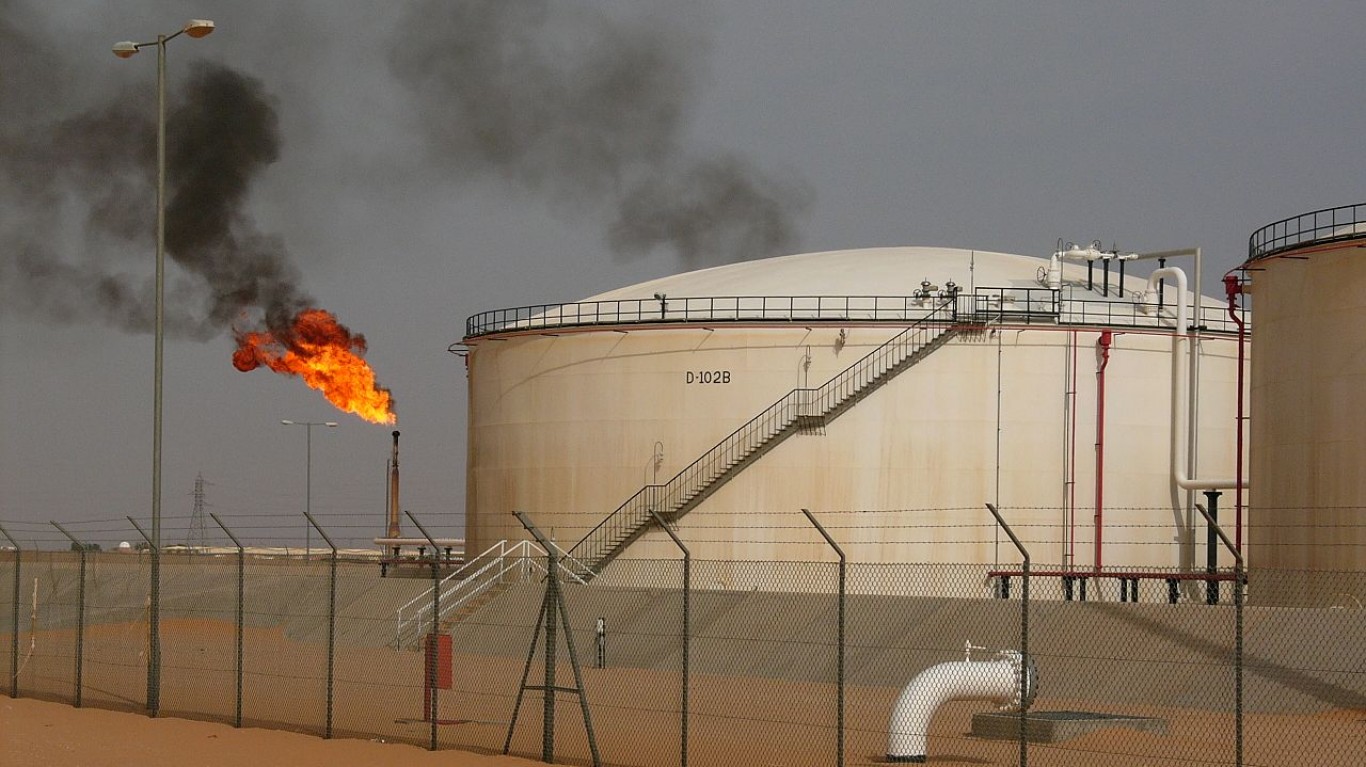
10. Libya
> Proven oil reserves: 48.4 billion barrels (2.9% of world total)
> 2017 daily oil production: 865,000 barrels
> 5 yr. oil production change: -42.7%
> GDP per-capita: $19,673
Libya has 48.4 billion barrels of proven oil preserves, the most of any country in Africa. However, oil production in Libya is relatively low. Due to political instability and conflict following the ousting of longtime dictator Muammar Gaddafi in 2011, oil production is down by 42.7% in the country over the last half decade. Libya is the only country on this list that produces less than a million barrels of oil per day on average.
Still, oil is critical to Libya’s economy. Petroleum accounted for over 95% of the country’s $16.1 billion in exports in 2017.
[in-text-ad]
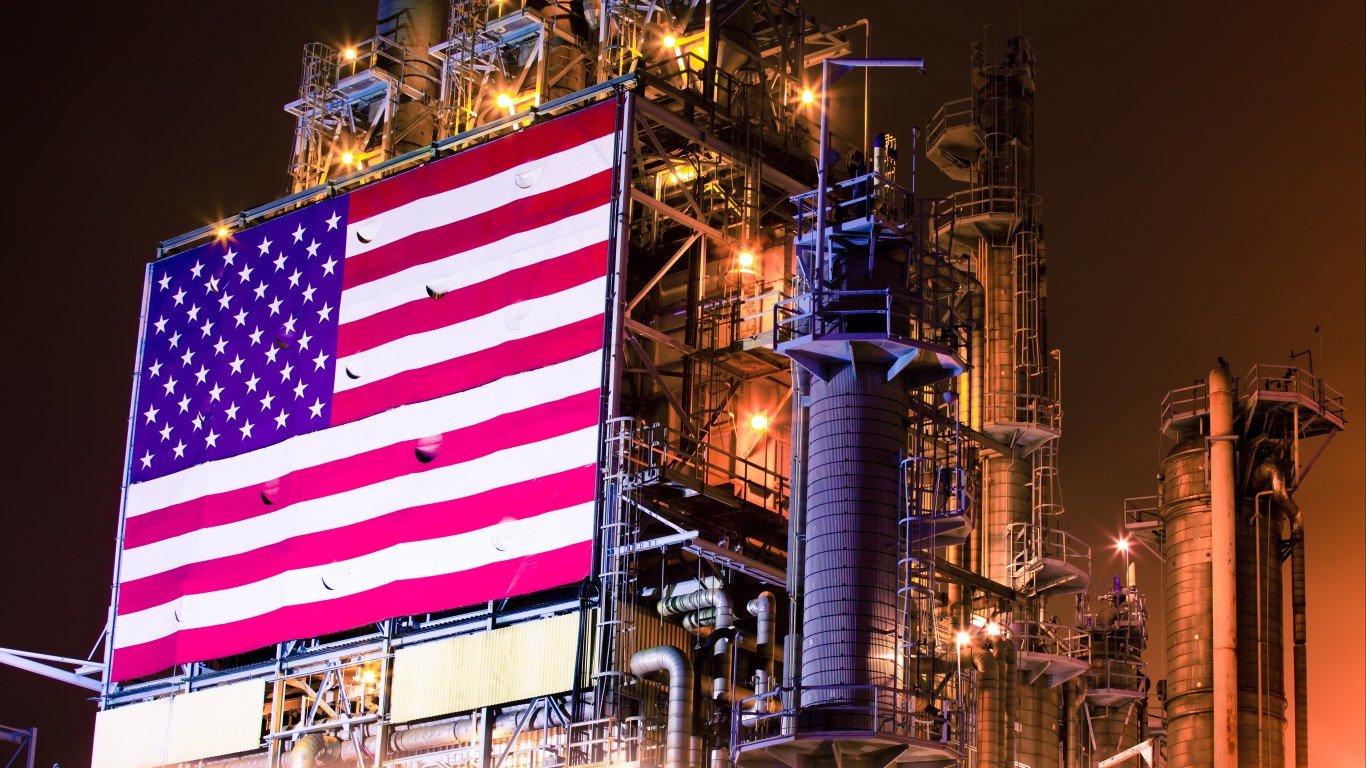
9. United States
> Proven oil reserves: 50.0 billion barrels (2.9% of world total)
> 2017 daily oil production: 13.1 million barrels
> 5 yr. oil production change: +46.6%
> GDP per-capita: $59,928
The United States has 50 billion barrels of proven oil reserves, more than all but eight other countries worldwide and equal to 2.9% of the world’s proven oil reserves. The United States also produces an average of 13.1 million barrels per day, the most of any country in the world and equal to 14.1% of daily global oil production. The state of Texas accounts for over a third of all oil production in the country.
Despite ranking ninth in the world in proven oil reserves, no country consumes more oil than the United States. To meet domestic energy demand, the country burns 913.3 million tons of oil a year, about 50% more than China, the world’s second largest consumer of oil. Petroleum accounted for about 9% of the $2.2 trillion in imports to the United States in 2017. The U.S. is also home to some of the largest energy companies in the world by revenue, including ExxonMobil and Chevron.
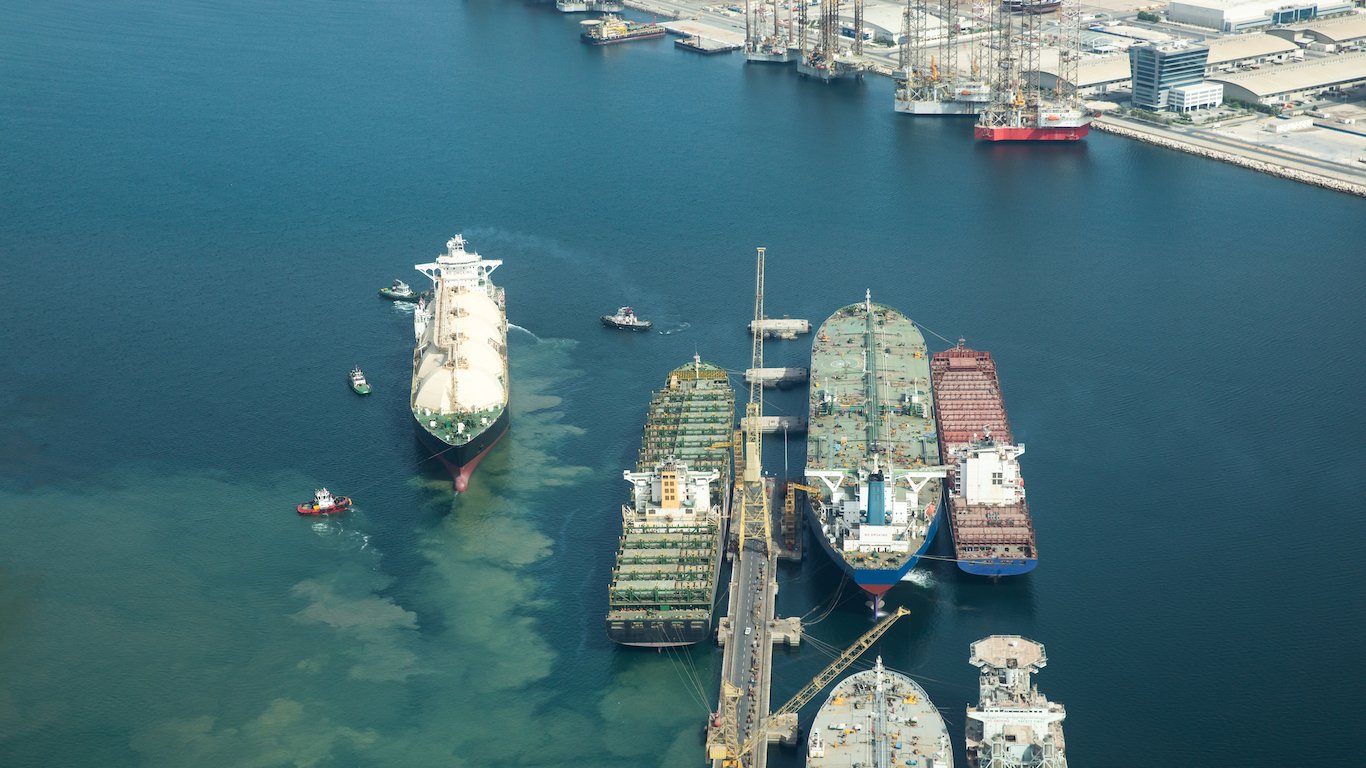
8. United Arab Emirates
> Proven oil reserves: 97.8 billion barrels (5.8% of world total)
> 2017 daily oil production: 3.9 million barrels
> 5 yr. oil production change: +14.7%
> GDP per-capita: $74,035
The UAE is an OPEC member state with nearly 98 billion barrels of proven oil reserves, or 5.8% of the global supply. Petroleum accounted for nearly half of UAE’s $142 billion in exports in 2017. While no further oil reserves will likely be discovered in the small Pesian Gulf nation, the country employs enhanced oil recovery techniques that allow it to be one of the world’s largest producers, churning out an average of 3.9 million barrels of oil a day.
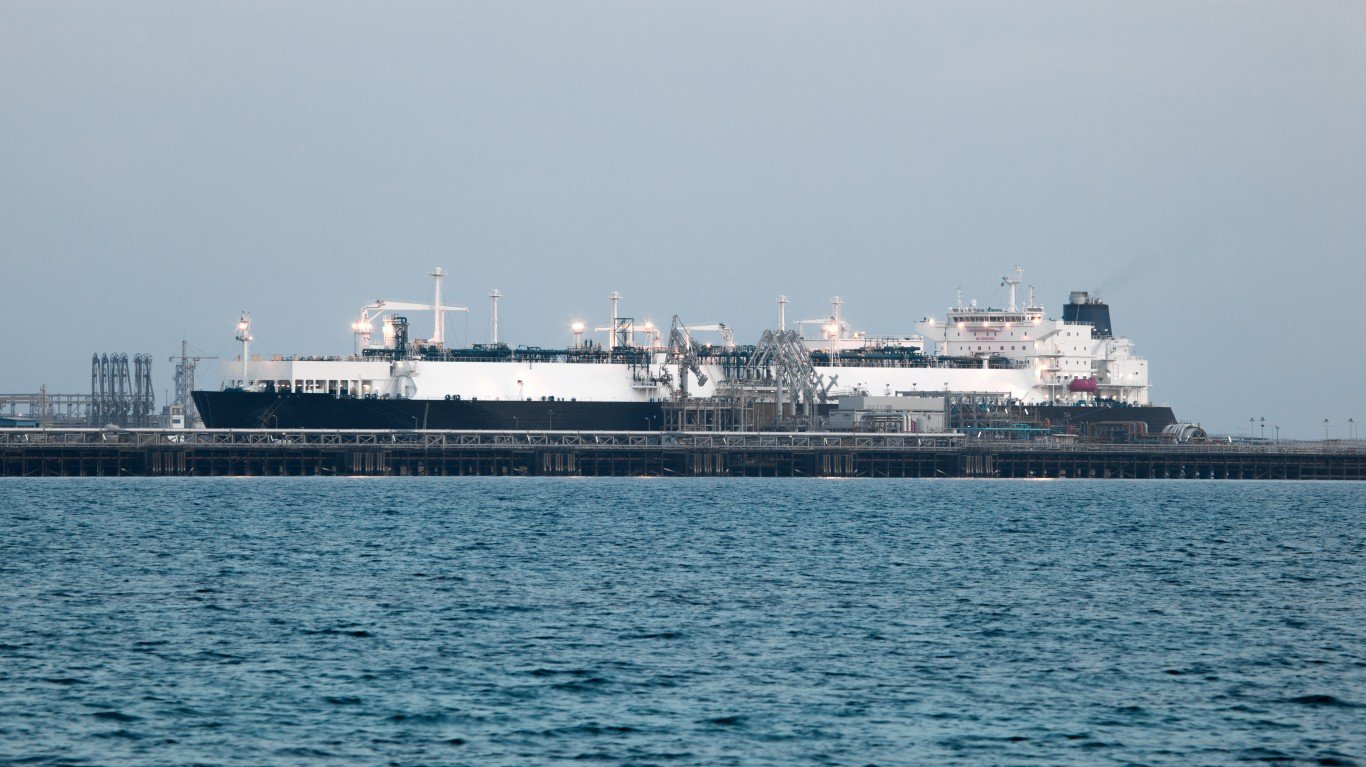
7. Kuwait
> Proven oil reserves: 101.5 billion barrels (6% of world total)
> 2017 daily oil production: 3.0 million barrels
> 5 yr. oil production change: -4.5%
> GDP per-capita: $72,096
Kuwait, an OPEC member state, is a small nation at the tip of the Persian Gulf that borders Iraq and Saudi Arabia — two other countries on this list. It is one of only seven countries in the world with oil reserves in excess of 100 billion barrels.
In August 1990, Kuwait was invaded by Iraq, in part because of its oil wealth. Iraq controlled about 20% of the world’s oil supply during its seven month occupation of Kuwait. The year before the Iraqi invasion, Kuwait produced 1.4 million barrels a day, its highest point in nearly a decade. In 1991, the year after the Iraqi invasion and occupation, oil production in Kuwait fell to an average of 185,000 barrels per day, by far the lowest rate in the country’s history. Today, Kuwait is an independent nation and produces 3 million barrels of oil a day.
[in-text-ad-2]
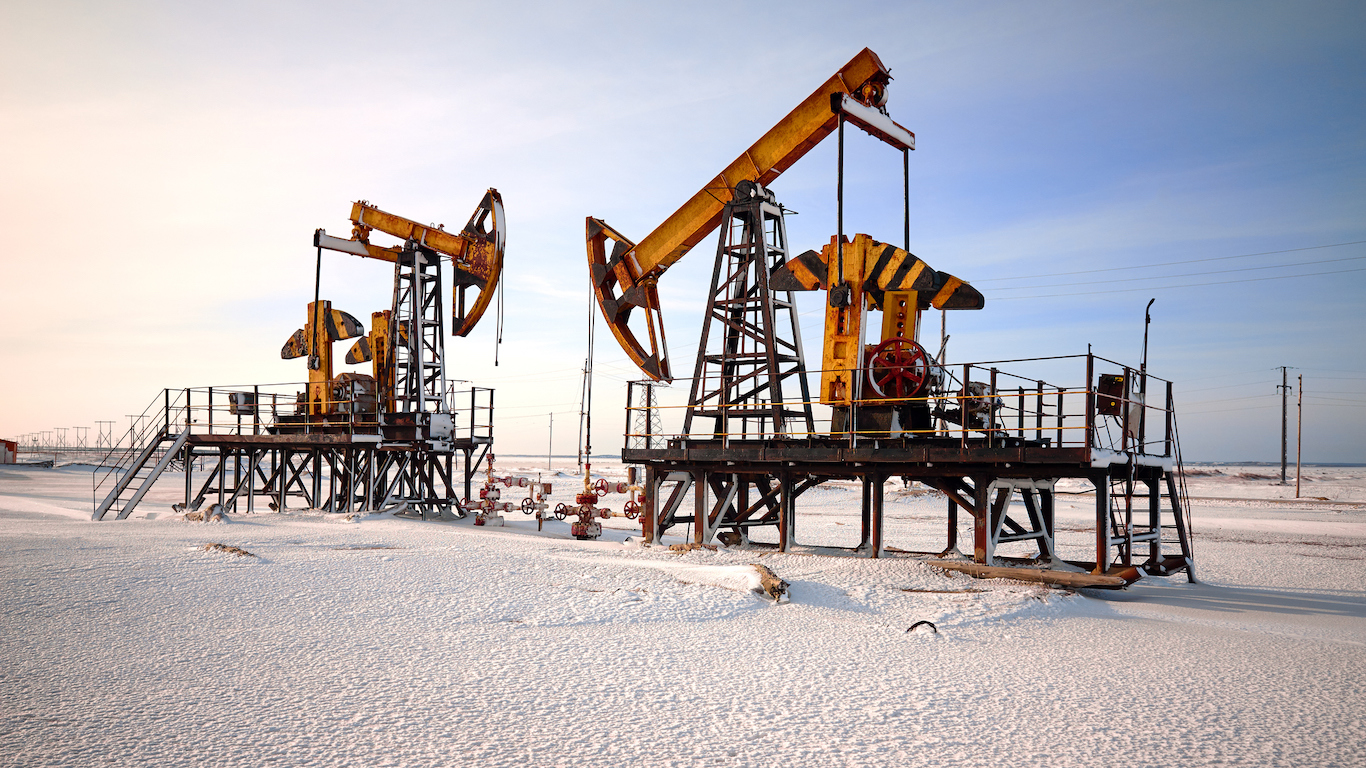
6. Russian Federation
> Proven oil reserves: 106.2 billion barrels (6.3% of world total)
> 2017 daily oil production: 11.3 million barrels
> 5 yr. oil production change: +5.6%
> GDP per-capita: $25,763
Russia is the largest country in the world by landmass, and over 106 billion barrels of proven oil reserves fall within the country’s borders. Along with the United States and Saudi Arabia, Russia is one of only three countries in the world producing more than 10 million barrels of oil per day. Petroleum accounted for over half of the country’s $341 billion in exports in 2017.
Russia’s economy, which relies heavily on oil revenue, has been hurt in recent years by economic sanctions imposed following the country’s 2014 invasion of the Crimean Peninsula. American imposed sanctions specifically target Russia’s energy companies.
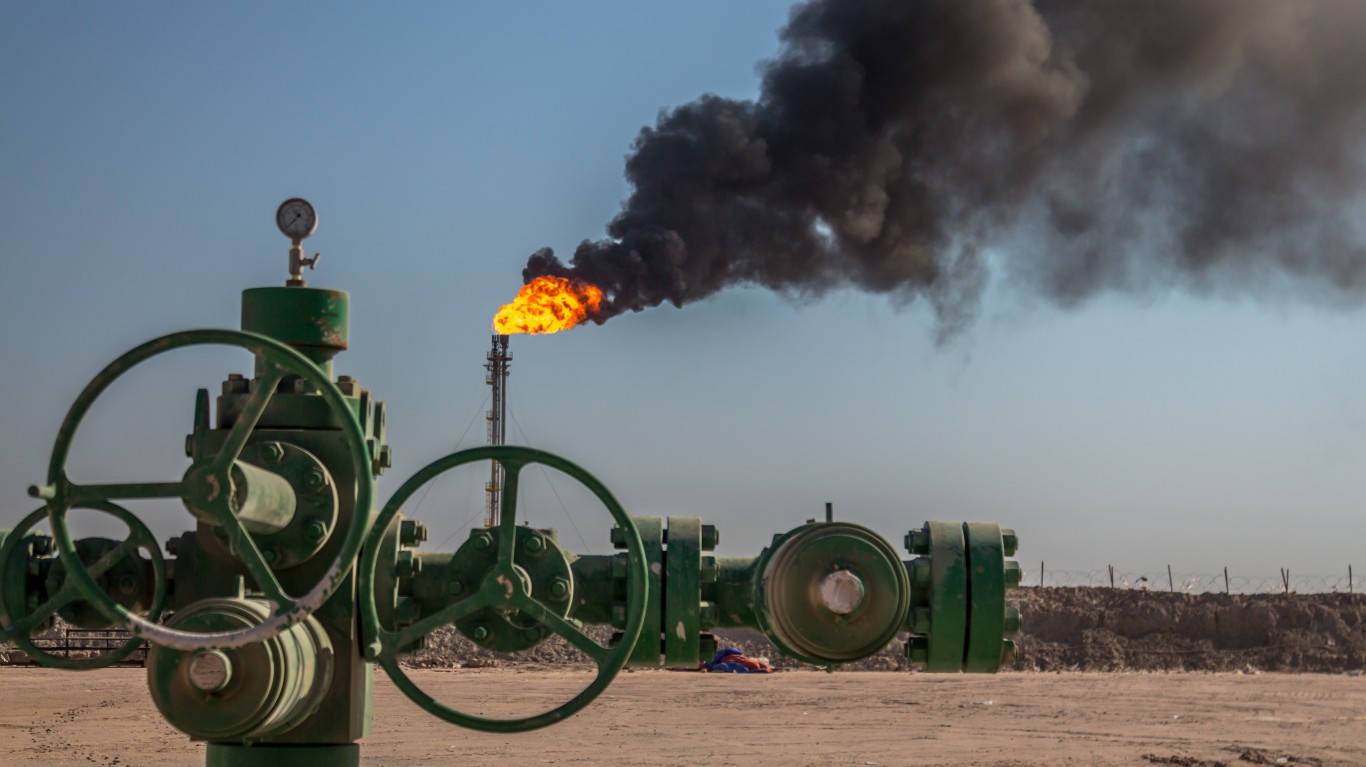
5. Iraq
> Proven oil reserves: 148.8 billion barrels (8.8% of world total)
> 2017 daily oil production: 4.5 million barrels
> 5 yr. oil production change: +46.8%
> GDP per-capita: $16,935
Iraq is sitting on the equivalent of 148.8 billion barrels of proven oil reserves, or nearly 9% of the known global oil supply. Iraq is heavily dependent on oil revenue, more so than most of its OPEC partners. Crude petroleum accounted for 95% of Iraq’s $60.8 billion in exports in 2017.
Iraq has been ramping up production in recent years. In the last half decade, average daily oil production in the country climbed from 3.1 million barrels to 4.5 million, a 46.8% jump.
[in-text-ad]
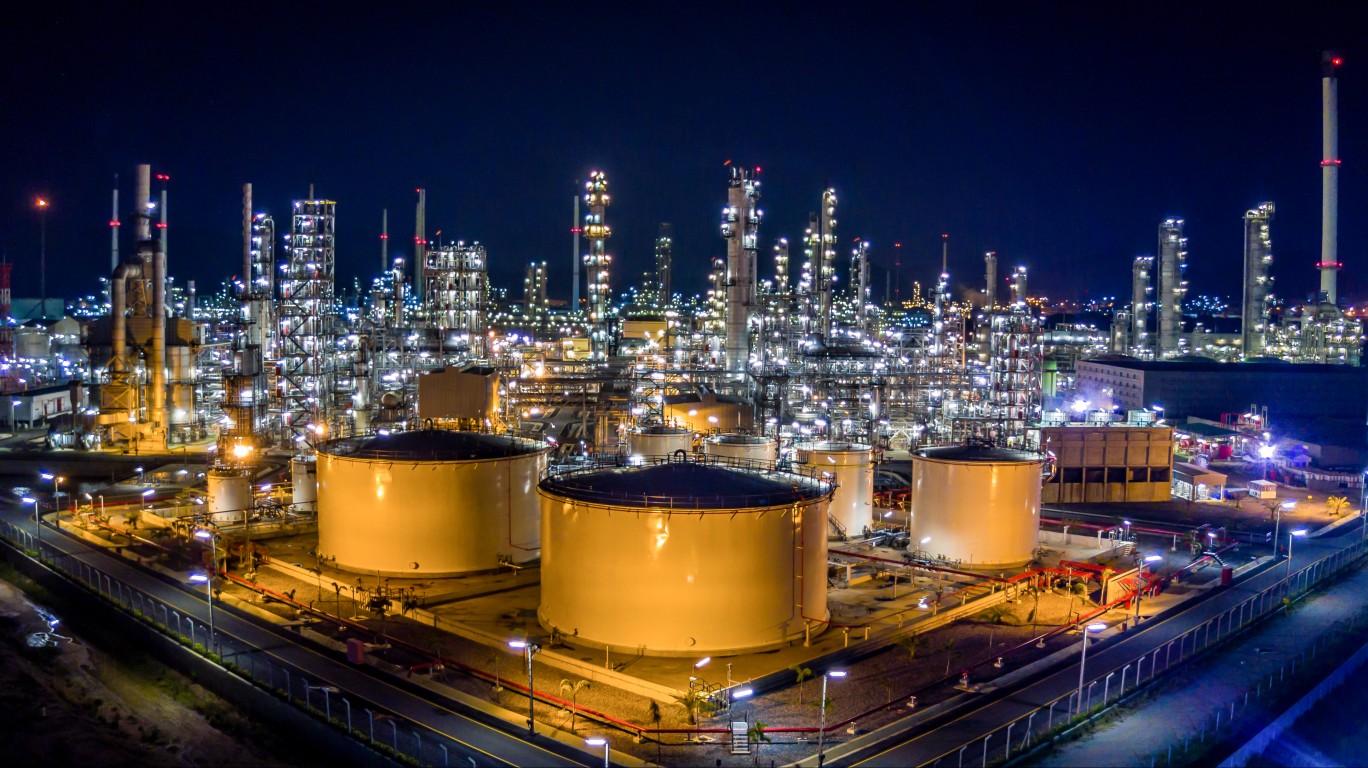
4. Iran
> Proven oil reserves: 157.2 billion barrels (9.3% of world total)
> 2017 daily oil production: 5.0 million barrels
> 5 yr. oil production change: +30.4%
> GDP per-capita: $20,885
A founding member of OPEC, Iran is one of only four countries in the world that controls over 150 billion barrels of oil. Churning out an average of 5 million barrels a day, it is also one of the world’s largest oil producers. All oil exploration and production in Iran is managed by the state-owned National Iranian Oil Company.
Though oil production spiked by 30.4% in Iran between 2012 and 2017, that trend will likely not continue. Newly imposed U.S. sanctions restrict five formerly exempt nations — China, India, Japan, South Korea, and Turkey — from buying oil from Iran. The new policy, designed to cut off finances to Tehran and restrict the country’s nuclear ambitions, could reduce oil production by as much as half a million barrels a day.
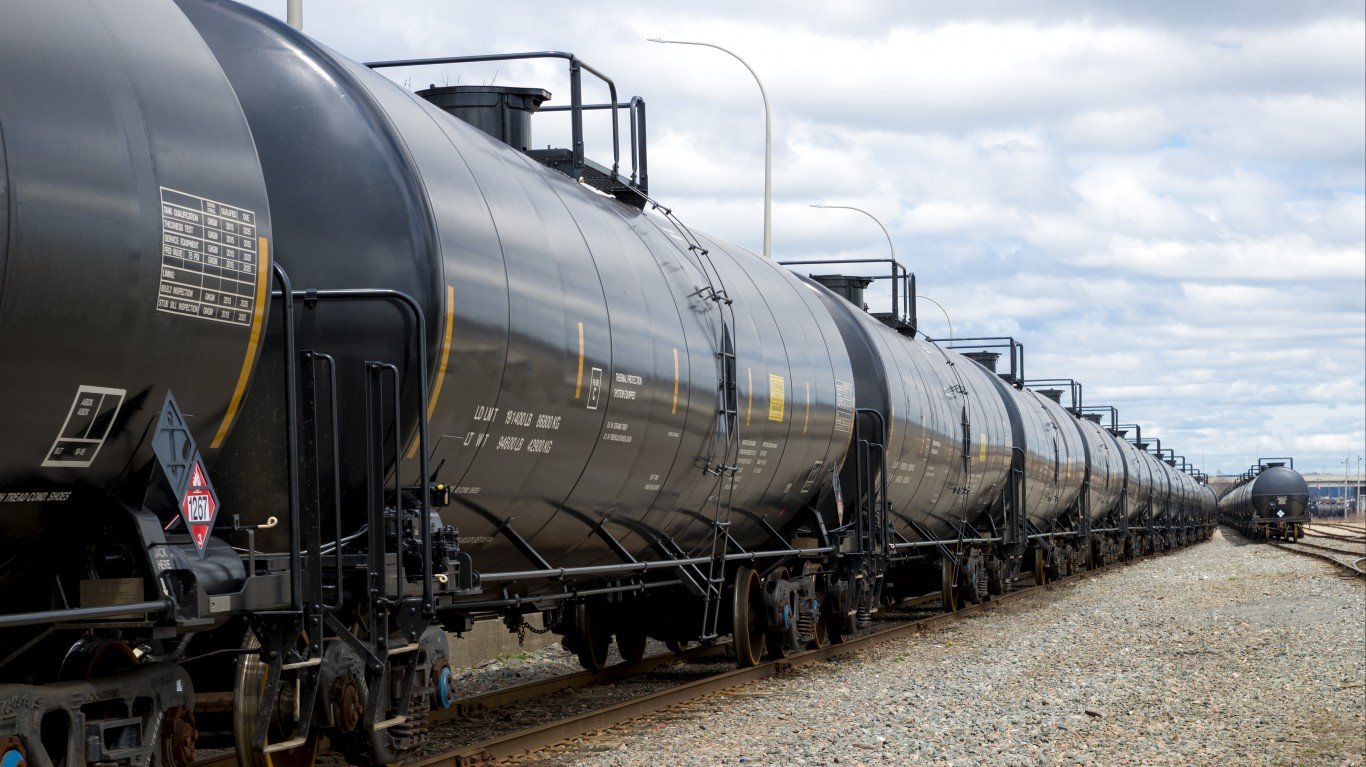
3. Canada
> Proven oil reserves: 168.9 billion barrels (10% of world total)
> 2017 daily oil production: 4.8 million barrels
> 5 yr. oil production change: +29.2%
> GDP per-capita: $46,510
The second largest country in the world by landmass, Canada controls the equivalent of 168.9 billion barrels of oil, the most of any country in North American and the third most of any country in the world. Despite its rich energy resources, Canada has a relatively diversified economy, and petroleum accounted for less than 20% of the country’s $377 billion in exports in 2017.
Oil production has climbed 29.2% in Canada over the last half decade. The country produced a record high 4.8 million barrels per day in 2017. Corporate giants in Canada’s privatized oil sector include Suncor, Syncrude, Canadian Natural Resources Limited, and Imperial Oil.
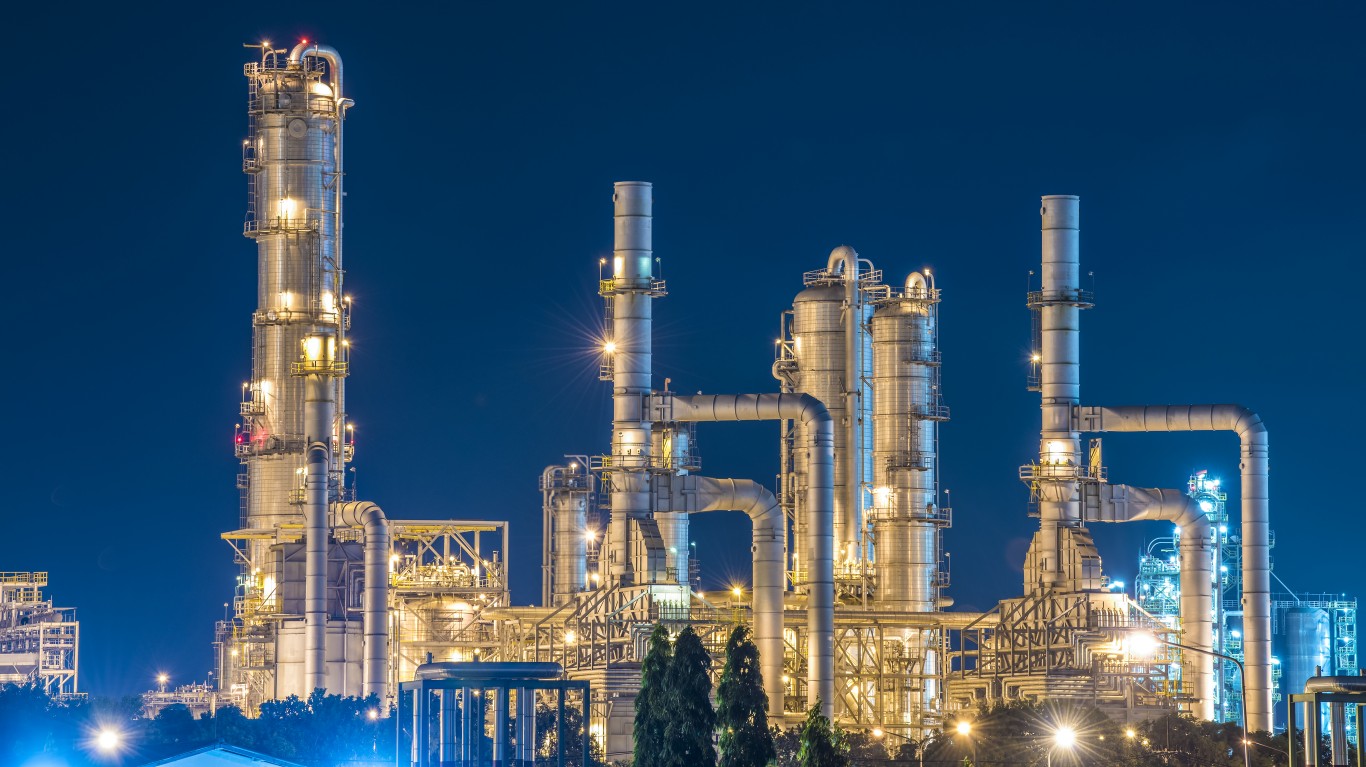
2. Saudi Arabia
> Proven oil reserves: 266.2 billion barrels (15.7% of world total)
> 2017 daily oil production: 12.0 million barrels
> 5 yr. oil production change: +2.7%
> GDP per-capita: $53,893
There are 266.2 billion barrels worth of oil in Saudi Arabia, by far the most of any OPEC nation and the second most of any country in the world. The country also produces 12 million barrels of oil on a daily basis, more than every country other than the United States. Heavily dependent on its oil industry, Saudi Arabia derived more than 75% of its $170 billion in 2017 export revenue from petroleum. Falling oil prices in 2014 hurt the country’s economy and GDP fell by 14.7% between 2014 and 2016.
Because of its oil reserves, Saudi Arabia is a strategic U.S. ally, despite human rights violations and strains imposed by multiple international incidents, including the Saudi nationality of 15 of the 9/11 hijackers.
[in-text-ad-2]
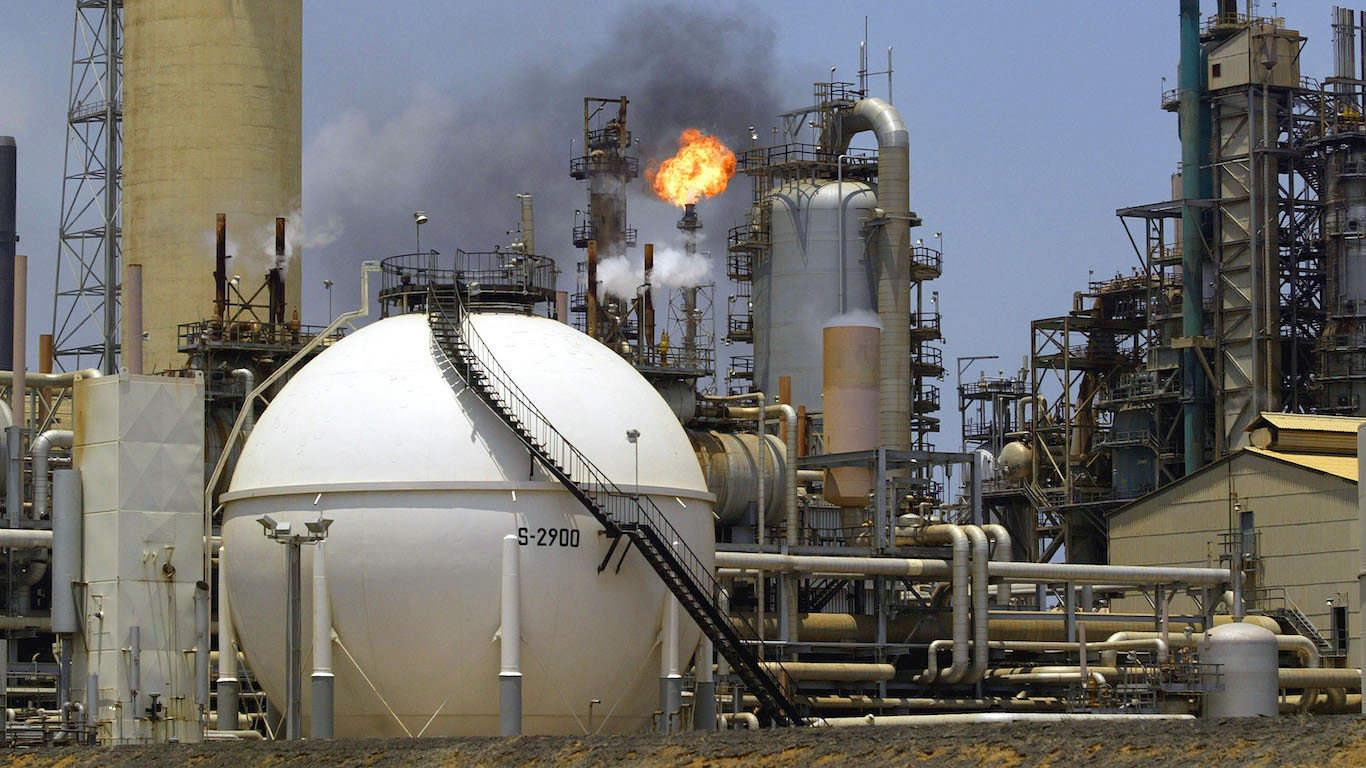
1. Venezuela
> Proven oil reserves: 303.2 billion barrels (17.9% of world total)
> 2017 daily oil production: 2.1 million barrels
> 5 yr. oil production change: -22.0%
> GDP per-capita: N/A
Venezuela, a country in economic freefall and facing an explosive political crisis, has more proven reserves of oil than any other country in the world. There are 303.2 billion barrels worth of oil in the country, nearly 18% of global reserves. The South American country’s economy is highly dependent on oil, with petroleum accounting for over 90% of total exports.
The country’s current crisis is partially the result falling global oil prices and spending oil revenues on social services rather than reinvesting in aging oil extraction infrastructure. Due to antiquated refineries and extraction tools, production in Venezuela stands at 2.1 million barrels per day, down 22.0% from just five years ago and well below the country’s all-time high of 3.8 million barrels a day in 1970.
Sponsored: Attention Savvy Investors: Speak to 3 Financial Experts – FREE
Ever wanted an extra set of eyes on an investment you’re considering? Now you can speak with up to 3 financial experts in your area for FREE. By simply
clicking here you can begin to match with financial professionals who can help guide you through the financial decisions you’re making. And the best part? The first conversation with them is free.
Click here to match with up to 3 financial pros who would be excited to help you make financial decisions.
Thank you for reading! Have some feedback for us?
Contact the 24/7 Wall St. editorial team.
 24/7 Wall St.
24/7 Wall St.
